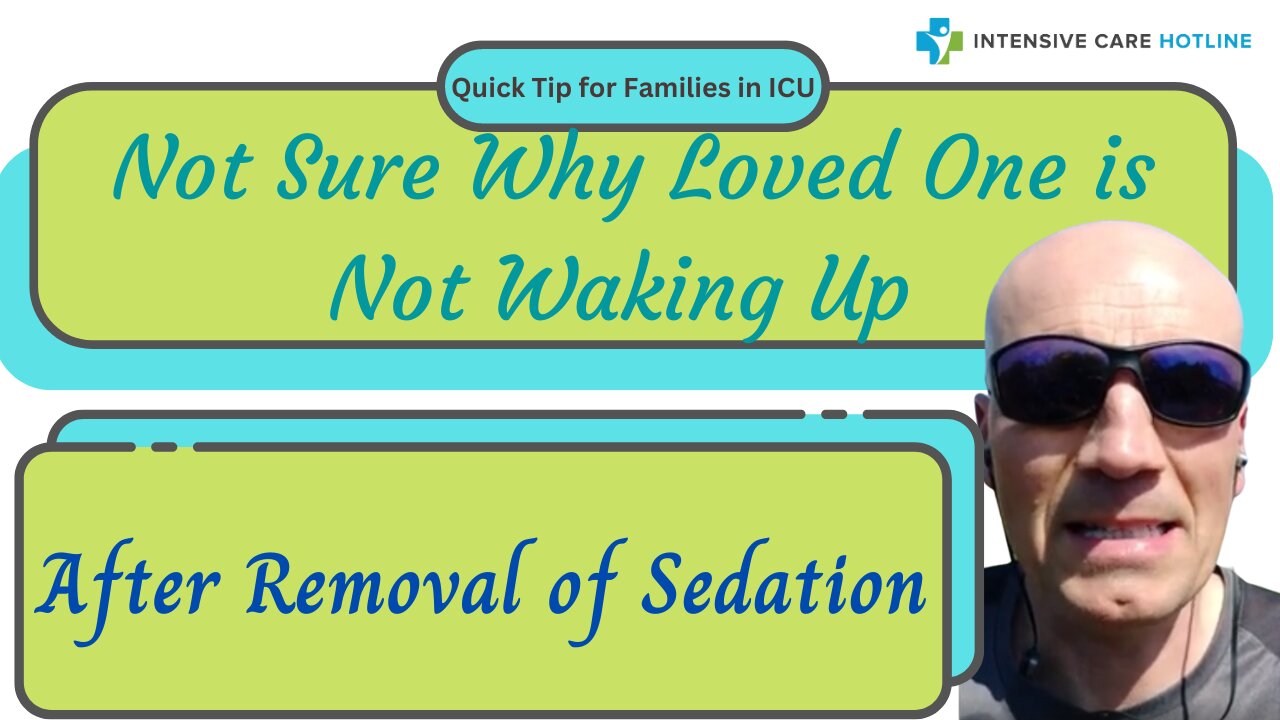Premium Only Content

Quick tip for families in ICU: Not sure why loved one is not waking up after removal of sedation!
Quick Tip for Families in ICU: Not Sure Why Loved One is Not Waking up After Removal of Sedation!
Book your free 15 minute phone consultation here
http://intensivecarehotline.com/scheduling-appointment/
Call directly 24/7
+1 415-915-0090 USA/Canada
+44 118 324 3018 UK
+6141 094 2230 Australia
Email [email protected]
Get 1:1 consulting and advocacy
1:1 phone counselling
http://intensivecarehotline.com/one-on-one-counselling/
Become a member for families of critically ill Patients in Intensive Care
https://intensivecarehotline.com/intensivecaresupport-org-membership/
Immediate action steps http://intensivecarehotline.com/take-control-take-charge/immediate-action-steps/
https://intensivecareathome.com
And if you need a medical record review, click on the link and we can help you with reviewing your loved one’s medical records while they’re in ICU.
https://intensivecarehotline.thrivecart.com/review-of-medical-records/
Hi, it’s Patrik Hutzel from intensivecarehotline.com with another quick tip for families in intensive care. So, today’s tip is about an email that I got from a reader, and the reader says, “I’m unsure why my loved one isn’t waking up after an induced coma and sedation has been switched off.” That’s a question we get quite frequently, and let me elaborate on why your loved one may not wake up.
So, there could be a number of reasons. You didn’t share whether your loved one has a head or brain injury. That could be one of the reasons. If he or she didn’t have a head or brain injury, and your loved one is still not waking up, then the ICU team needs to rule out a neurological event such as a head or brain injury, stroke or seizures. And that can be done by doing an MRI (Magnetic Resonance Imaging) scan or a CT (Computed Tomography) scan of the brain or by doing an EEG (Electroencephalograph).
Next, what else could be happening? What else could be happening, is simply that your loved one is critically ill. And critically ill patients do not wake up according to a textbook that you switch sedation off and then on day two at two o’clock in the afternoon, they’re going to wake up miraculously. No, that’s not how it works. It’s not following strict rules and guidelines. It very much depends on the individual, how sick are they? Is treatment working? How old are they? Generally speaking, the older a patient is, the longer it takes to wake up.
Next, what sedation and what opiates has your loved one been on? For example, common sedatives in ICU nowadays are propofol, midazolam or Versed, or Precedex. That’s the three most commonly used sedatives in 2022. And generally speaking, most commonly used opiates are fentanyl and morphine. And let’s just quickly run through them.
Propofol, is a short-acting sedative. That means it has a short onset and it means it works pretty quickly, but it should also stop working once you stop it. So, patients should wake up reasonably quickly.
Midazolam, is a long-term acting sedative and it takes much longer to get out of the system. It’s also addictive in nature, so there could be some withdrawal going on.
Precedex, is sort of a combination of the two. It works for sedation, but also for pain relief. And Precedex is sort of somewhere in between where it takes sort of a medium time to wake up from my experience anyway.
And then you’ve got morphine and fentanyl in the mix, while strong opiates, again, who literally knock a patient out and that takes some time to wake up as well after they’ve had opiates such as morphine or fentanyl.
In any case, you got to be patient and you got to look for the signs of waking up. You got to make sure there hasn’t been a neurological event. It’s got to be ruled out. As I said, you got to watch out for things such as withdrawal from midazolam because it’s a benzodiazepine or from the morphine or from the fentanyl who are strong opiates.
Now, next it also comes down to kidney failure or liver failure. Potentially if the kidneys are impaired or the liver is impaired it takes much longer for sedatives and opiates to get out of the system. So that could be another reason why your loved one isn’t waking up.
And I should also quickly focus again on the critical illness. Let’s just say your loved one is in ICU with the pneumonia and the pneumonia has been cleared with the antibiotics or whatever the case may be, it’s still taking its toll on the body and therefore it can take days, sometimes weeks to wake up. So most importantly, you should stay very patient here and very focused and just give it time. Time is often the biggest healer.
So, that is my quick tip for today.
Continue reading at: https://intensivecarehotline.com/blog/quick-tip-for-families-in-icu-not-sure-why-loved-one-is-not-waking-up-after-removal-of-sedation/
-
 0:56
0:56
Intensive Care Hotline
9 hours agoWhy Families Need Strategy Before ICU Meetings
1 -
 LIVE
LIVE
SavageJayGatsby
5 hours ago🌊🐠 Subnautica: Nitrox Sunday 🐚💙
4,732 watching -
 24:34
24:34
HaileyJulia
9 days agoThis Christian Morning Routine Changed Everything for Me
6.99K3 -
 LIVE
LIVE
Putther
3 hours ago $1.39 earned🔴LAZY SUNDAY STREAM!! (GTA + MORE)
199 watching -
 30:13
30:13
Congressman Randy Fine
3 hours agoCongressman Fine Virtual Press Conference on the Democrat Shutdown
16.4K37 -
 LIVE
LIVE
GritsGG
4 hours agoQuads Into Ranked Top 30! Most Wins in WORLD! 3734+!
64 watching -
 LIVE
LIVE
GamerGril
2 hours agoI'm Up To My Neck In Zombie Blood 💞Dying Light The Beast💞
150 watching -
 53:29
53:29
Tactical Advisor
5 hours agoUnboxing New Guns | Vault Room Live Stream 042
105K9 -
 LIVE
LIVE
Ouhel
4 hours agoSUNDAY | BATTLEFIELD 6 | O'HELL LIVE | RUMBLE UPDATE
103 watching -
 56:20
56:20
Steven Crowder
1 day agoEXPLAINED: Is America Headed For a Market Crash?
144K106